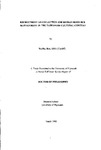Recruitment and selection and human resource management in the Taiwanese cultural context
| dc.contributor.author | Hsu, Yu-Ru | |
| dc.contributor.other | Plymouth Business School | en_US |
| dc.date.accessioned | 2013-11-22T16:06:13Z | |
| dc.date.available | 2013-11-22T16:06:13Z | |
| dc.date.issued | 1999 | |
| dc.identifier | NOT AVAILABLE | en_US |
| dc.identifier.uri | http://hdl.handle.net/10026.1/2835 | |
| dc.description | Merged with duplicate record 10026.1/818 on 15.02.2017 by CS (TIS) | |
| dc.description.abstract |
The focus of this research is upon human resource management and recruitment and selection practices in the Taiwanese cultural context. The samples were primarily focused upon manufacturing industry in Taiwan. The postal questionnaire was chosen for data collection. The 500 manufacturing companies randomly selected for this research were sent two questionnaire each. The questionnaire on HRM and recruitment and selection (HRMRS) was addressed to HR manager whereas the questionnaire on work-related values of national culture was addressed to non-managerial employee. The research results indicate that there is a general desire among HR professionals in manufacturing organizations that HRM polices are integrated with corporate strategies and that HRM should be involved in decision making at board level. Evidence was also obtained that some HRM decisions are shared between line management and HR specialists and that line managers had a particularly influential role in decisions regarding recruitment and selection, training and development, and workforce expansion/reduction. There was also some evidence supporting an assertion that certain recruitment and selection practices were culturally sensitive and this was supported by evidence of association between practice and country of ownership. The research also suggests that work-related values in Taiwan have changed over the last twenty years since Hofstede's original work and that in particular there had been change in the direction of Individualism and Masculinity. However, there was also evidence that traditional Chinese/Confucian values were still important to employees. These cultural findings have implications for the practice of HRM including appropriate recruitment and selection policies and practices. There was also some evidence that wok-related values vary with ownership pattern, company size, as well as with gender, age, and levels of educational attainment. This research contributes to the body of knowledge through the findings detailed above and these were used to develop an analytical framework of HRM in Taiwan which encompasses work-related values as part of both the internal and external organizational context and which might also form an appropriate base for comparative analysis. | en_US |
| dc.language.iso | en | en_US |
| dc.publisher | University of Plymouth | en_US |
| dc.title | Recruitment and selection and human resource management in the Taiwanese cultural context | en_US |
| dc.type | Thesis | |
| plymouth.version | Full version | en_US |
| dc.identifier.doi | http://dx.doi.org/10.24382/4681 | |
| dc.identifier.doi | http://dx.doi.org/10.24382/4681 |
Files in this item
This item appears in the following Collection(s)
-
01 Research Theses Main Collection
Research Theses Main


